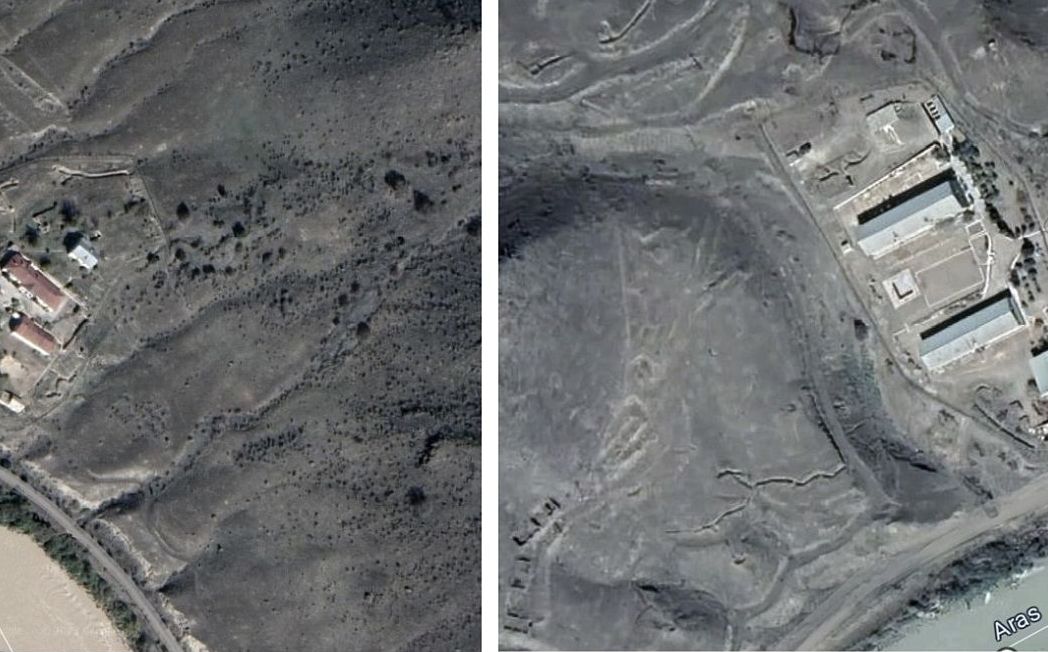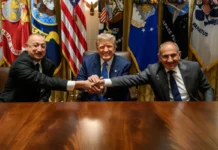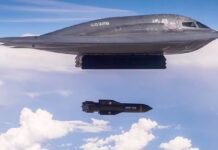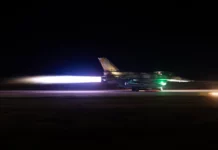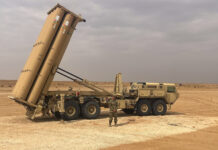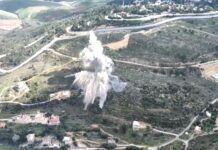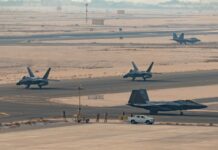Two exogenous events are currently reshaping the South Caucasus: the War in Ukraine and the Israel-Hamas conflict in Gaza.
The invasion of Ukraine forced Russia to re-prioritise the significance of the region, which evolved from the backwater of its ‘near abroad’ neo-colonial space to the main logistical hub of its war economy. Russia currently works with its historical regional foes – Iran and Turkey – in what might be called a Concert of Three. This Concert was moulded in Astana in 2017, when the three powers convened to determine the future of Syria without Western involvement. This exclusionary regionalisation is now enveloping the Caucasus. More recently, the web of relationships with a security bearing in Gaza now affects stability in the Caucasus: Iran, Turkey and Russia will find it more difficult to compartmentalise their security posture.
Iran and Regional security after Ukraine
The war in Ukraine ended what remained of the Pax Russica in the Caucasus. Russia now needs to work with its historical foes in the Caucasus, Turkey and Iran, to sustain its war economy. Every state in the region is feeling a positive economic boost from trading with Russia. A recent report by the Asian Development Bank paints a picture of miraculous GDP growth for the Caucasus states in 2022: Armenia (12.6%), Georgia (10.2%), and Azerbaijan (4,6%). The report attributes this growth to re-exporting activity towards Russia, as well as the migration of businesses, people, and capital from Russia. A range of sources also points to Iran’s geoeconomic benefits.
Tehran is central to transit trade towards Russia, and the internationally-sanctioned continuum from the Baltic Sea to the Indian Ocean presents a range of opportunities. Tehran’s ‘Look East’ economic narrative envisions a shift from the margins of the global economy to the epicentre of a Eurasian economic regime. That is not merely ‘a vision’. Russia emerged in 2022 as Iran’s foremost foreign investor and trading partner, and Iran is due to accede to the Eurasian Customs Union by early 2024.[1] Of equal significance is the security dimension of this partnership. Attention in western media often focuses on the delivery of Iranian Shahid loitering munitions and Mohajer drones to Russia, critical to the war effort in Ukraine. However, Iran’s gains are long-term, securing access to strategic Russian technology: digital surveillance and missile defence systems, attack helicopters, and fifth-generation fighter jets.[2]
The newfound symmetry of this relationship also entails a threat. Iran can no longer count on Russia as the guarantor of the territorial status quo in the Caucasus. As the Covid-19 pandemic unfolded in September 2020, Azerbaijan launched a major offensive against Armenia. By 9 November 2020, Armenia was forced to sign a Russian-mediated ceasefire agreement, conceding the loss of territories governed by the self-proclaimed Republic of Artsakh. Azerbaijan’s victory came with a caveat. The ceasefire agreement provided for the continued presence of the autonomous region linked to Armenia by the Lachin Corridor (Article 6), a transport artery linking the territory to the Republic of Armenia. The corridor was to be under the custody of a Russian peace-keeping force of just under 2,000 troops (Article 3).
This status quo held until the war in Ukraine, when Azerbaijan seized the opportunity to end Armenian self-governance in Nagorno-Karabakh altogether. In August 2022, Lachin came under the control of Azerbaijani troops, encountering no resistance from Russia. In December 2022 Baku stepped up the disruption of energy, people, and goods to Karabakh.[3] In June 2023 the region was sealed off and in September 2023, Azerbaijani troops advanced to assert full control over the territory. The Russian peace keeping force did not intervene.[4]

Credit: Professor Eduard Abrahamyan
While Armenian access to the Lachin corridor eroded, Azerbaijan’s President Ilham Aliyev referenced the November 2020 ceasefire agreement (Article 9) to demand a corridor linking the Republic of Azerbaijan and its exclave of Nakhchivan, known as the ‘Zangezur corridor’. The ceasefire agreement envisioned entrusting the security of this notional transport artery to Russia’s Border Guard Service (PB FSB). Armenia has been reluctant to implement this, but Azerbaijan has continued to press the issue via coercive means. From September to November 2021 Azerbaijani troops made inroads into sovereign Armenian territory. Later, in September 2022 Azerbaijani troops made further inroads into Armenia, coming within reach of the towns of Kapan, Goris, Vardenis, Sotk, Artanish, Jermuk, and Ishkhanasar. Yerevan triggered the collective defence clause of the Collective Security Treaty Organisation (CSTO) but neither the 4,000 FSS border guards nor the Russian military heeded the call.[5]
Russia is effectively no longer Armenia’s security guarantor,[6] while Russian servicemen control the entire Armenia-Iran borderline.[7] This complicates Tehran’s ability to assist Armenia and fill the security vacuum left by Russia’s de facto disengagement. During the Second Karabakh War in 2020, Iran became the sole reliable transit state for the movement of weapons and ammunition to Armenia. Yet in the aftermath of the Second Karabakh War, Iran has accepted the new status quo. For instance, when Azerbaijan arrested two Iranian truckers transiting via the Goris-Kapan highway in the Lachin region, Tehran ensured fines were paid and pledged to invest in an alternative transport route that bypasses Azerbaijan’s sovereign territory.[8]
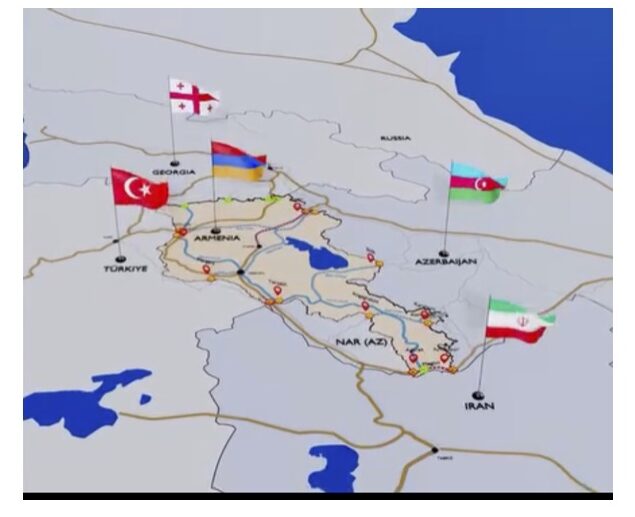
Credit: The Government of the Republic of Armenia
Having said this, Iran has repeatedly stated that it would not tolerate Azerbaijan’s control over the South of Armenia. In response to the ‘Three Brothers’ military drills between Turkey, Azerbaijan, and Pakistan along the Iranian border in September 2021, the IRGC conducted drills that included amphibious crossings of the Arax River, heliborne and parachute jump operations, night operations, and the simulated seizure of routes and heights controlled by a hypothetical enemy.[9] Historically, Iran did not have hypothetical enemies in Russia’s near-abroad. However, Tehran has drawn a red line with southern Armenia, unwilling to allow the de facto Turkish-Azerbaijani control of the Armenian borderline, creating what is in effect a cordon sanitaire between Armenia and Iran. After the Azerbaijani incursion into Armenian territory in September 2022, Iran took action by mobilising a force of 50,000 troops, opening a consulate in Kapan, and welcoming the EU observation mission in Armenia’s Syunik Province, the southernmost in the country, which shares a border with Iran. With respect to acceptance of Azerbaijan’s presence, Tehran’s consistent message has been ‘Yes to Karabakh, no to Syunik.’
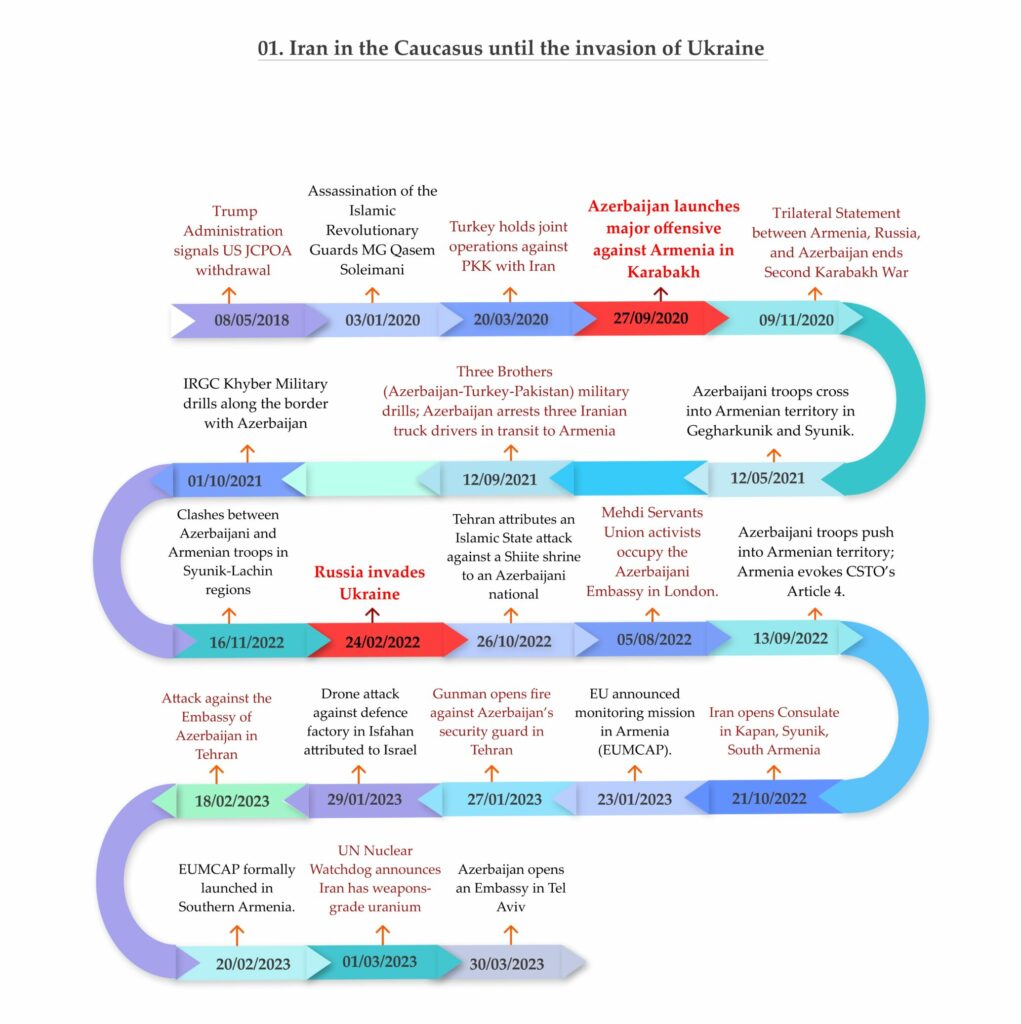
Credit: Dr Eshan Dastgheib and Somayeh Maleki
Iran and Regional security after Gaza
Iran views Azerbaijan’s positioning in South Armenia as a threat to its own national security for two reasons: firstly, due to ethnic Azerbaijani secessionism within Iran; secondly due to the perceived threat of Azerbaijani collusion with Israel. While Russia was present, there was no contradiction in the special relationship between Ankara and Baku – the ‘one nation, two states’ partnership – and the strategic alliance between Baku and Tel Aviv. A partnership of equals in the Caucasus now means that Tehran, Ankara, and Moscow need to build consensus between them and minimise the intervention of external actors. They agree on the latter objective, but their consensus is facing more of a challenge after Hamas’ 7 October 2023 attack on Israel.
Azerbaijan’s strategic relationship with Israel is often referred to as the ‘iceberg relationship,’[10] in the sense that its greatest part is hidden under the surface. The two parties cooperate on communications, energy, military procurement, reconnaissance, and intelligence gathering.[11] Through this partnership, Israel has been keen to develop a ‘go-it-alone’ option to attack Iran without US support.[12] Iran accuses Azerbaijan of providing airfields for Israeli UAVs that enable direct action within Iranian territory.[13] By contrast, Azerbaijani diplomats are on the record denying Israel the refuelling support that would render attacks deep into Iranian territory a credible threat.[14] Experts point to Israel’s attack against nuclear installations in Isfahan in January 2023, carried out with small quadcopter drones probably smuggled via Azerbaijan. In sum, Azerbaijan is understood to either assist or merely facilitate Israeli covert action.
Azerbaijan and Israel clearly share a perception of Iran as a security threat operating through militant Shia Muslim proxies.[15] Historically, the Republic of Azerbaijan in Tehran is referred to as ‘the Republic of Baku’[16] while Azerbaijani analysts refer to Northern Iran as ‘South Azerbaijan.’[17] This is not about two states contesting territory but a clash of worldviews. The two states compete for the hearts and minds of Turkic-speaking Shia communities in the Caucasus, pitting Shia allegiance against Turanic patriotism. The managing director of a news outlet linked to IRGC recently referred to people living “on both sides of the Aras river” as culturally Iranians.[18] The Azerbaijani analyst Ali Hajizade has pointed to dozens of Iranian-sponsored media sources that seek to mobilise support against Azerbaijan via Shia propaganda.[19]
Azerbaijan sees Iran as a domestic threat and vice versa.[20] Historically,[21] Iran’s response to a security threat in the region includes the instrumentalisation of Shia militancy.[22] Israel’s Foreign Minister, Eli Cohen, pointed the finger at Iran for foiled attacks against Israeli Embassies in Baku, Athens, and Nicosia. By the same token, President Ilham Aliyev pointed the finger at Iran for an attack against Azerbaijan’s Embassy in Tehran[23] and the occupation of the Azerbaijani Embassy in London.[24] An organisation known as Hoseynun or ‘Defenders of the Shrine’ is making inroads into Azerbaijan’s Talysh community, and is vaguely associated with the Iran-sponsored Hezbollah movement and recognised as a branch of Soleimani’s ‘Axis of Resistance.’ For its part, Tehran is not particularly covert in its engagement with this movement – on 18 October 2023, the leader of the Hoseynun movement visited Tehran and was interviewed by their public broadcaster.
How Iran engages with the Caucasus is changing. The appointment of Ambassador Mehdi Sobhani in Yerevan in March 2023 was viewed as highly significant,[25] both because of his former posting in Syria and his ties to the IRGC. More recently, in November 2023, the commander of the IRGC ground forces of Iran, Sardar Pakpour, was inspecting defence facilities along the Jolfa region, which borders Azerbaijan’s Nakhchivan enclave, signalling this is no longer the exclusive preserve of the military. In sum, Iran is bringing to bear resources previously tested in the Levant.

Credit: Dr Eshan Dastgheib and Somayeh Maleki
In this security context, it is unclear whether Ankara and Baku share the same security priorities. While Washington speaks of Turkey as “a bulwark against Iran” (Shaheen-Romney Bipartisan Bill, July 2022) that is a fanciful proposition. Turkey’s newly-appointed foreign minister, Hakan Fidan, is the former Director of the National Intelligence Organisation (MIT) that cultivated an amicable partnership with Major General Qassem Soleimani, forged during the war against ISIL in Iraq and Syria.[26] Significantly, Ankara condemned Soleimani’s assassination and finds it easier to coordinate with Tehran than its Western allies on the Kurdish question.[27] Seeking its own ground force in Syria, Washington built a partnership with the Syrian Democratic Forces[28], which has fuelled a reservoir of anti-American rhetoric in Turkey.[29] Events in Gaza have galvanised this rhetorical alignment with Tehran, particularly in the context of Turkish leadership’s expressed tolerance of Hamas.[30]
The cooperation between the Iranian Revolutionary Guards (IRGC) and Turkish businessmen in Lebanon is an uncontested reality.[31] Beyond the Levant, Iran’s secret services have been given the leeway to target dissidents in Turkey.[32] It then comes as no surprise that Israel regards Turkish intelligence and Foreign Minister Fidan as a foe,[33] particularly as MIT has come down hard against Mossad’s counter-Iranian activity in Turkey.[34] The fact that Israel has developed a strategic partnership with the Kurds cements the ‘enemy-of-my-enemy-is-my-friend’ dynamic between Ankara and Tehran.[35] In any event, Fidan visited Tehran on 1 November 2023 for consultations regarding the effect of Israel’s Gaza campaign in Lebanon and Syria. In follow-up statements, the Iranian foreign minister scolded Azerbaijan’s fuel exports to Israel.[36] Clearly, the crisis in Gaza points to friction between the Concert of Three and the ‘one nation, two states’ dictum.
Iran’s new security posture in the Caucasus
Iran has held its ground without adventurism in the Caucasus, which was largely recognised as a Russian sphere of influence. However, the dramatic transformation of the diplomatic and security landscape following the war in Ukraine means that Iran’s security posture is under review. Moscow and Tehran now effectively form an internationally-sanctioned continuum that Ankara is well placed to exploit, reaping economic and strategic benefits in the process. Lavrov’s emotive comparison of Gaza’s siege with the Nazi siege of Leningrad, and Erdogan’s recent proclamation that ‘the end is near’ for Israel suggests that the partnership with Iran is resilient.[37] However, Turkey needs to balance this partnership with its ‘one nation, two states’ partnership with Azerbaijan.
It is now conceivable that the Caucasus can be enveloped in the web of conflict escalation in the Levant. Should the conflict in Gaza escalate, there could be wider mobilisation among Shia movements. To think of these developments as wholly separate and compartmentalised can be deceiving, particularly when considering not state-actors. Often, emerging militant movements claim responsibility for actions not instigated by them but loosely inspired by their ideas, in what is a well-established pattern of brand name terrorism. The storming of a passenger aircraft in Dagestan by a mob in search of Jewish Israeli passengers[38] is a clear indication of how opportunities to exploit tension can arise. In sum, proxy movements are instrumental to, but not necessarily controlled by Iran and that is true in the Caucasus as much as the Levant. Should the conflict in Gaza spread to Lebanon, Israel may have to press its allies for every tactical advantage it can secure, not least the ability to strike strategic locations within Iran. Strategic advantage may also be gained by covert action in Iran, instrumentalising the South Azerbaijan movement. This means non-state actors can potentially trigger events that undermine security.
The perception of threat often has the same effect as covert action. Iran may believe Azerbaijan to be a threat, moving pre-emptively to build closer ties with Armenia and bolster its ties with Shia militants. Iran has already mobilised three times along its border with Armenia, which indicates that its security posture is linked to its own national security considerations both vis-à-vis Azerbaijan and Israel. In this context, it would be useful to think of the post-Soviet space in the Caucasus as having become enveloped in the geopolitical framework of Middle Eastern insecurity. Iran and Israel already do.
Ilya Roubanis
[1] Ilya Roubanis, “Russia’s invasion of Ukraine: the geopolitical significance of the war’s impact on regional supply chains,” the Foreign Policy Centre, London, July 28, 2023
[2] Ashish Dangwal, Iran confirms acquiring 24 Sukhoi Su-35 fighters from Russia; jets to arrive during Iranian year in March,” Eurasian Times, August 19, 2023, https://www.eurasiantimes.com/leaving-the-west-baffled-iran-confirms-purchasing-24-russian/
“Iran expected consequences for sending arms to Russia – leaked documents,” Iran International, June 19, 2023, https://www.iranintl.com/en/202306182196
Deborah Haynes, “Arms contract shows Iran sold Russia ammunition for Ukraine war, says security source,” Sky News, June 5, 2023, https://news.sky.com/story/arms-contract-shows-iran-has-sold-russia-ammunition-for-ukraine-war-says-security-source-12896127
Don Lieber, Benoit Faucon, Michael Amon, “Russia supplies Iran with cyber weapons as military cooperation grows,” Wall Street Journal, March 27, 2023, https://www.wsj.com/articles/russia-supplies-iran-with-cyber-weapons-as-military-cooperation-grows-b14b94cd
Dion Nissenbaum, Warren Stribel, “Moscow, Tehran advance plans for Iranian-designed drone facility in Russia, Wall Street Journal,” February 5, 2023, https://www.wsj.com/articles/moscow-tehran-advance-plans-for-iranian-designed-drone-facility-in-russia-11675609087?mod=article_inline
Ashish Dangwal, Iran confirms acquiring 24 Sukhoi Su-35 fighters from Russia; jets to arrive during Iranian year in March,” Eurasian Times, August 19, 2023, https://www.eurasiantimes.com/leaving-the-west-baffled-iran-confirms-purchasing-24-russian/
[3] Kirill Krivosheev, “Russian peacekeepers find themselves sidelined in Nagorno-Karabakh,” Carnegies Endowment for International Peace, December 15, 2022, https://carnegieendowment.org/politika/88651
[4] “Azerbaijan accuses Russia of failing to fulfil Karabakh deal,” Aljazeera, July 16, 2023, https://www.aljazeera.com/news/2023/7/16/azerbaijan-accuses-russia-of-failing-to-fulfil-karabakh-deal
Lilit Shahverdyan, “Nagorno-Karabakh under total blockade,” Eurasianet, June 23, 2023, https://eurasianet.org/nagorno-karabakh-under-total-blockade
[5] Armine Margaryan, “CSTO:closer to Azerbaijan than Armenia, Part I,” ENV Report, December 13, 2022, https://evnreport.com/politics/csto-closer-to-azerbaijan-than-armenia-part-i/
Armenia asked CSTO for military support to restore territorial integrity amid Azeri attack, Armenpress, September 14, 2022, https://armenpress.am/eng/news/1092504/
[6] Manik Tadevosian, “Armenia: disendchanment with the CSTO,” Regard Sur L’ Est, July 3, 2023, https://regard-est.com/armenia-disenchantment-with-the-csto
Danief Boffey, “Putin’s griop on regional allies loosens again after Armenian snub,” The Guardian, Friday November 25, 2022, https://www.theguardian.com/world/2022/nov/25/putinsgrip-regional-allies-loosen-again-after-armenia-snub-csto-summit
Mark Trevelyan, “Hosting Putin, Armenian leader complains of lack of help from Russian-led alliance,” Reuters, November 23, 2022, https://www.reuters.com/world/front-putin-armenian-leader-laments-lack-help-russian-led-alliance-2022-11-23/
Gabriel Gavin, “Pelosi’s visit fires debate in Armenia over alliance with Russia,” Politico, September 19, 2021, https://www.politico.eu/article/nancy-pelosi-visit-armenia-debate-alliance-russia/
Maryam Sinae, “Tehran says diplomacy needed to resolve Baku-Yerevan conflict,” Iran International, Seprember 19, 2022, https://www.politico.eu/article/nancy-pelosi-visit-armenia-debate-alliance-russia/
[7] Eduard Abrahamyan, “Russia’s growing military deployment in Syunik: a challenge to Armenian sovereignty and defence,” Research Memo No.1, Institute for Security Analysis, October 24, 2023.
[8] “Azerbaijan releases Iranian truck drivers at centre of diplomatic dispute,” RFE/RL, October 21, 2021, https://www.rferl.org/a/azerbaijan-iran-truckers-dispute/31523027.html
[9] Vali Kaleji, Sergey Markedonov, Kerim Has, “The breakdown of the status quo and the international dimension of the Nagorno-Karabakh crisis,” Valdai Club, January 18, 2022, https://valdaiclub.com/a/highlights/iran-s-perceptions-and-concerns-of-border-tensions/
Abbas Qaidari, “Iranian war games on the border with Azerbaijan were really a message to Israel,” Atlantic Council, October 8, 2021,
Golnaz Esfandiari, “Explainer: What’s Behind Fresh Tensions on the Iran-Azerbaijan Border?”, RFE/RL, October 1, 2021, https://www.rferl.org/a/iran-azerbaijan-military-drills-border/31488035.html
[10] Ilgar Gurbanov, “Azerbaijan’s defence minister visits Israel, as bilateral ties grow stronger,” Eurasia Daily Monitor, Vol. 14, Issue 117, September 25, 2017, https://jamestown.org/program/azerbaijans-defense-minister-visits-israel-as-bilateral-ties-grow-stronger/
Thomas Grove, “Insight: Azerbaijan eyes aiding Israel against Iran,” Reuters, October 1, 2012, https://www.reuters.com/article/us-iran-israel-azerbaijan-idUSBRE88T05L20121001
Luke Baker, “Israel engaged in covert war inside Iran: report,” Reuters, February 18, 2009, https://www.reuters.com/article/us-israel-iran-sabotage-idUKTRE51G1VR20090218
[11] Said Musayeve, “Israel-Azerbaijan partnership: Invisible parts of the ‘iceberg,’” December 16, 2016, https://www.jpost.com/blogs/said-musayev/israel-azerbaijan-partnership-invisible-parts-of-the-iceberg-475090
[12] “Azerbaijan eyes aiding Israel against Iran,” Ynetnew.com, September 30, 2012, https://www.ynetnews.com/articles/0,7340,L-4287140,00.html
[13] “Baku to allow Israel to use its airfields to attack Iran – Report,” Iran International, May 3, 2023, https://www.iranintl.com/en/202303057139
“US official suspects Israel’s hand behind drone strike on Iran factory, Azerbaijan embassy staff shifted to Baku,” India Today, January 30, 2023, https://www.indiatoday.in/world/story/us-suspects-israel-hand-behind-drone-strike-on-iran-factory-azerbaijan-embassy-staff-shifted-to-baku-2327976-2023-01-30
John Gambrel, “Iran says drone attack targets defense facility in Isfahan,” Independent, Sunday, January 29, 2023, https://www.independent.co.uk/news/ap-iran-tehran-azerbaijan-israeli-b2271557.html
“Iran Claims Israeli drone was launched from ex-Soviet Republic,” RFE/RL, August 27, 2014, https://www.rferl.org/a/iran-israel-drone-azerbaijan/26553382.html
[14] Maayan Jaffe-Hoffman, “Azerbaijan envoy to Israel: You cannot use our airfields to attack Iran,” Jerusalem Post, March 10, 2023, https://www.jpost.com/international/article-733935
[15] Lilah Shoval, “In Azerbaijan, Israel’s defence chief discusses Iran, security cooperation,” Al-Monitor, Jauly 14, 2023, https://www.al-monitor.com/originals/2023/07/azerbaijan-israels-defense-chief-discusses-iran-security-cooperation
[16] “Why Iranians are calling for war with Azerbaijan,” Middle East Eye, April 11, 2023, https://www.middleeasteye.net/news/iran-azerbaijan-war-are-calling-why
[17] Ariel Kogan, “Tehran’s new ‘old fear’: Southern Azerbaijan wants independence,” i24News.tv, March 2, 2023, https://www.i24news.tv/en/news/middle-east/iran-eastern-states/1677754384-iran-s-new-old-fear-southern-azerbaijan-wants-independence
Emil Aslan Souleimanov, Josef Kraus, “Iran’s Azerbaijan Question in Evolution: Identity, Society, and Regional Security,” Central Asia-Caucasus Institute & Silk Road Studies Program, Silk Road Paper, September 2017, https://isdp.eu/content/uploads/2017/09/2017-souleimanov-kraus-irans-azerbaijan-question-in-evolution.pdf
Emil Suleimanov, “The evolution of Azebraijani identity and the prospects of secessionism in Iranian Azerbaijan,” Connections, Vol.11, No.1, Winter 2011, https://www.jstor.org/stable/26326266?searchText=&searchUri=&ab_segments=&searchKey=&refreqid=fastly-default%3A22a005c596a51e6dd222dec06ae3a7b0&seq=1
Unrepresented United Nations, https://www.unrepresentedunitednations.org/en/unrepresented-united-nations-directory/south-azerbaijan
[18] Abodollah Ganji Twitter Account, October 1, 2021, Managing Director of the Javan Daily, affiliated to the IRGC. https://twitter.com/ab_ganji/status/1443853234079256583?s=20
[19] Ali Hajizade, “Malignant Iranian Activity in the South Caucasus,” Jewish New Syndicate, April 4, 2023, https://www.jns.org/malignant-iranian-activity-in-the-south-caucasus/
- https://www.youtube.com/watch?v=_CC1JGEP75M
- https://t.me/Huseyniyyun_Az
- https://www.youtube.com/c/MUSELMANXALQ313/videos
- https://t.me/VAHIDUMMAT
- https://www.youtube.com/channel/UCr-6VrBaU92mPm3xAxHGVJg/videos
- https://t.me/orxanmammadov
- https://t.me/suru_psixologiyasi
- https://www.youtube.com/channel/UCoNmRBb8WlxiWOnAqTmin0Q/videos
- https://t.me/azerbaycan313
[20] Tzvi Joffre, “Azerbaijan arrests group established by Iranian intelligence,” The Jerusalem Post, November 1, 2022, https://www.jpost.com/international/article-721211
[21] Peyman Asadzade, “Azerbaijan’s Hoseyniyun: the prospects and challenges of a Caucasus Hezbollah, Middle East Institute, June 12, 2023, https://www.mei.edu/publications/azerbaijans-hoseyniyun-prospects-and-challenges-caucasus-hezbollah
Omar Ahmed, “”The Huseynyun: Iran’s new IRGC-backed movement in Azerbaijan,” October 9, 2021, https://www.middleeastmonitor.com/20211009-the-huseynyun-irans-new-irgc-backed-movement-in-azerbaijan/
Mahammad Maharramov, “Hezbollah Symbolism and Its Activities in Azerbaijan,” Mazaryk University, July 2021, https://www.researchgate.net/publication/353315426_Hezbollah_Symbolism_and_Its_activities_in_Azerbaijan
Nasib L. Nassibli, “Azerbaijan-Iran Relations: Challenges and Prospects, Belfer Center, Kennedy School for Science and International Affairs, November 30, 1999, https://www.belfercenter.org/publication/azerbaijan-iran-relations-challenges-and-prospects
[22] https://www.fardanews.com/fa/tiny/news-1211628
[23] Zulfugar Agayev, “Azeri President blames Iran’s ‘establishment’ for embassy attack,” Bloomberg, February 18, 2023, https://www.bloomberg.com/news/articles/2023-02-18/azerbaijan-president-blames-iran-s-establishment-for-embassy-attack#xj4y7vzkg
Natalia Bagirova, “Azerbaijan strongly protests to Iran after fatal embassy shooting,” Reuters, January 17, 2023, https://www.reuters.com/world/asia-pacific/guard-killed-shooting-azerbaijans-embassy-iran-2023-01-27/
[24] Heydar Isayev, “Extremist religious group attacks Azerbaijani embassy in London,” Eurasianet, August 5, 2022, https://eurasianet.org/extremist-religious-group-attacks-azerbaijani-embassy-in-london
[25] Sobhani appointed as new Iran envoy to Armenia, IRNA, March 30, 2023, https://en.mfa.ir/portal/newsview/715765/Sobhani-appointed-as-new-Iran-envoy-to-Armenia
[26] “Iranian academic Azizi says slain Quds Force commander Qassem Someimani looms large in deal as in life,” Al-Monitor, July 2023, https://www.al-monitor.com/podcasts/iranian-academic-arash-azizi-says-slain-quds-force-commander-qassem-soleimani-looms-large
Adam Entous, “Turkey Spymaster Plots Own Course in Syria,” The Wall Street Journal, October 10, 2013, https://www.wsj.com/articles/turkey8217s-spymaster-plots-own-course-on-syria-1381373295
[27] “Turkey says Killing of Soleimani to fuel instability,” Reuters, January 3, 2020, https://www.reuters.com/article/iraq-security-blast-turkey-idUSP8N26O013
[28] “Conflict between Turkey and Armed Kurdish Groups,” Center for Preventive Actions, June 12, 2023, https://www.cfr.org/global-conflict-tracker/conflict/conflict-between-turkey-and-armed-kurdish-groups
[29] “Turkish minister say US behind 2016 failed coup – Hurriyet,” Reuters, February 4, 2021, https://www.reuters.com/article/turkey-security-usa-int-idUSKBN2A41NF
[30] “Erdogan calls Israel a terrorist,” The Sunday Times, November 14, 2023, https://www.youtube.com/watch?v=ugo0sayGT6M&ab_channel=TheTimesandTheSundayTimes
Erdogan’s speech claiming ‘Israel’s end is near,’ Newsweek, November 16, 2023, https://www.newsweek.com/erdogan-israel-hamas-gaza-views-million-1844272
Tuvan Gumrukcu, Huseyin Hayatsever, “Turkey’s Erdogan says Hamas is not a terrorist organisation, cancels trip to Israel,” Reuters, October 25, 2023, https://www.reuters.com/world/middle-east/turkeys-erdogan-says-hamas-is-not-terrorist-organisation-2023-10-25/
[31] “The Turkish connection: how Erdogan’s confidant helped Iran finance terror,” Politico, December 8, 2022, https://www.politico.eu/article/sitki-ayan-recep-tayyip-erdogan-terrorism-hezbollah-iran-turkey-lebanon/
[32] Menekse Tokyay, “Iranian dissident journalist Moradi ‘abducted’ in Turkey,” Arab News, June 6, 2022, https://www.arabnews.com/node/2097376/middle-east
[33] Marc Daou, “The Kurds are the ‘ideal scapegoat for both Turkey and Iran,’” France 24, France 24, November 23, 2022, https://www.france24.com/en/middle-east/20221123-the-kurds-are-the-ideal-scapegoat-for-both-turkey-and-iran
Hamidresa Azizi, Salim Cevik, “Turkish and Iranian Involvement in Iraq and Syria,” SWP (Stiftung Wissenchaft und Politik), October 12, 2022, https://www.swp-berlin.org/10.18449/2022C58/
“Pro-Netanyahu paper says Turkey’s spy chief Fidan ‘next in line after Soleimani,” Daily Sabah, January 28, 2020, https://www.dailysabah.com/politics/2020/01/28/pro-netanyahu-paper-says-turkeys-spy-chief-fidan-next-in-line-after-soleimani
Murtaza Hussain, “Portrait of a General,” The Intercept, January 5, 2020
Abdullah Bozkurt, “Turkish intelligence chief Fidan, an Iranian asset, secretly met with Quds Force chief Soleimani in Tehran,” Nordic Monitor, February 3, 2020, https://nordicmonitor.com/2020/01/turkish-intelligence-chief-fidan-irans-asset-met-quds-force-chief-soleimani-secretly-in-tehran/
[34] Canaan Lidor, “Turkey said to bust Mossad ring operating against Iranian targets,” The Times of Israel, May 23, 2023, https://www.timesofisrael.com/turkey-said-to-bust-mossad-ring-operating-against-iranian-targets/
Oren Dorell, “Turkey outing of Mossad a betrayal, say former spies,” USA Today, October 18, 2013, https://www.google.com/search?q=Iranian+intelligence+operates+freely+in+Turkey&sxsrf=AB5stBgXNUZx49HIDwDO55qAN03DAITQjw%3A1689874559088&ei=f3C5ZIqCBY-E8gLT8biABw&ved=0ahUKEwjKvbym6Z2AAxUPglwKHdM4DnAQ4dUDCBE&uact=5&oq=Iranian+intelligence+operates+freely+in+Turkey&gs_lp=Egxnd3Mtd2l6LXNlcnAiLklyYW5pYW4gaW50ZWxsaWdlbmNlIG9wZXJhdGVzIGZyZWVseSBpbiBUdXJrZXkyCBAhGKABGMMESO-KAVCkJVjVgQFwAXgBkAEAmAG-AqAB-x-qAQgyOC42LjMuMbgBA8gBAPgBAcICChAAGEcY1gQYsAPCAgcQIxiwAhgnwgIFEAAYogTCAggQABiJBRiiBMICChAhGKABGMMEGArCAgQQIRgK4gMEGAAgQYgGAZAGCA&sclient=gws-wiz-serp
[35] Scott Abramson, “Israelu Kurdophilia and the American ‘betrayal’ of the Syrian Kurds,” UCLA & Nazarian Centre for Israel Studies,” October 16, 2019, https://www.international.ucla.edu/israel/article/211984
[36] Ezgi Akin, “Turkey, Iran FMs warn over Israel’s expansion of Gaza war, disagree on oil boycott, Al-Monitor, November 1st, 2023, https://www.al-monitor.com/originals/2023/11/turkey-iran-fms-warn-over-israels-expansion-gaza-war-disagree-oil-boycott
[37] Mathias Hammer, “What Russia hopes to gain from the Israel-Hamas Conflict,” The Times, October 30, 2023, https://time.com/6329850/hamas-gaza-russia-putin-israel/
[38] Andrew Roth, “Mob storms Dagestan airport in search of Jewish passengers from Israel,” The Guardian, October 29, 2023, https://www.theguardian.com/world/2023/oct/29/mob-storms-dagestan-airport-in-search-of-jewish-passengers-from-israel



